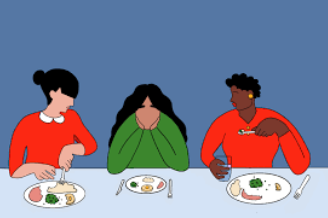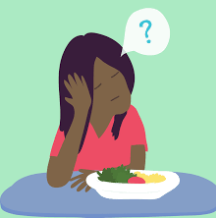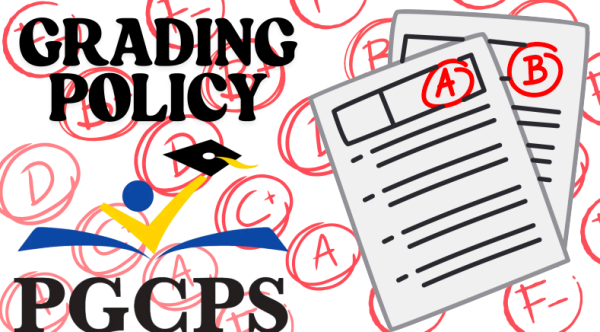What’s it like to have an eating disorder?
*trigger warning for mentions of EDs, and more*
Many might have a good relationship with food, knowing how to balance what they eat with how much of it they eat, and how much to move afterwards. While many do have that control, having an eating disorder creates a false sense of control in one’s head. It creates the feeling of having food in front of you, and questioning whether you’ll eat it or pretend you did because you ate yesterday and have an overwhelming sense of guilt for it.
 Not many will actually know what having an eating disorder really is, and what it feels like. Not many will understand to any level what kind of suffering someone with a binge eating disorder or another with anorexia experience. There is a stigma that’s often presented in modern media, that people with eating disorders choose not to eat, or choose to eat too much, this is false.
Not many will actually know what having an eating disorder really is, and what it feels like. Not many will understand to any level what kind of suffering someone with a binge eating disorder or another with anorexia experience. There is a stigma that’s often presented in modern media, that people with eating disorders choose not to eat, or choose to eat too much, this is false.
Having an eating disorder does not simply go one way. There are various kinds of eating disorders, but if you ask someone what an eating disorder is, it’s more likely they’ll only know about anorexia, and the kind of eating disorder that involves the lack of eating at all. Less light is shed on eating disorders that involve on and off eating, eating too much, and throwing your food up after eating. Sometimes even shame is expressed because people aren’t aware these exist.
“Having an e.d [eating disorder] is like a constant battle of right and wrong in my point of view,” said sophomore Jasper Thompson. “It’s like in my mind, I’m perfectly fine and me fasting is normal behavior but then I have these moments where I suddenly realize it’s horrible. I’m also aware that e.d is just depressing as hell, and it’s with ALL eating disorders like pica, bed, etc. you can’t go a minute with just enjoying life while your brain is yelling constant meals to eat or to start a fast.”
Pica is an eating disorder that involves eating things that are not generally thought of as food, and have no nutritional value. B.E.D. (binge eating disorder) is an eating disorder in which the person suffering from it eats more food than the average person, and essentially can’t stop eating. This eating disorder is one that many people are desensitized to because most people suffer from B.E.D. are plus size, and they’d rather be fatphobic than aware. Anorexia is an eating disorder that means the person suffering doesn’t eat enough, or can’t eat and therefore lacks necessary nutrition. These can all be life-threatening disorders and should be helped immediately.
Statistics show that about 9 percent of the population in the U.S. will experience an eating disorder at least once in their lifetime.
 “I didn’t actually figure out I had an eating disorder until later on. I was getting comments from family members on my eating, telling me I was eating way too much for a normal person, and how I have no self control while I’m eating,” said a student, who wishes to remain anonymous. ̈It wasn’t until someone told me that binge eating disorder is a thing, and I did my research. After a while, I realized I had a binge eating disorder. I never felt the same after coming to that realization. Knowing that there was a word for what I felt, what I still feel. It’s in its own way, heartbreaking but also comforting.”
“I didn’t actually figure out I had an eating disorder until later on. I was getting comments from family members on my eating, telling me I was eating way too much for a normal person, and how I have no self control while I’m eating,” said a student, who wishes to remain anonymous. ̈It wasn’t until someone told me that binge eating disorder is a thing, and I did my research. After a while, I realized I had a binge eating disorder. I never felt the same after coming to that realization. Knowing that there was a word for what I felt, what I still feel. It’s in its own way, heartbreaking but also comforting.”
According to eatingdisorderhope.com 10 million females and one million males will suffer from an eating disorder in their lifetime, and not many are able to obtain help for recovery.
Please contact The Eating Disorder Hotline if you or someone you know is suffering from an eating disorder and wish to seek help.
Your donation will support the student journalists of Parkdale High School. Your contribution will allow us to cover our annual website hosting costs and publish some printed editions, as well.






